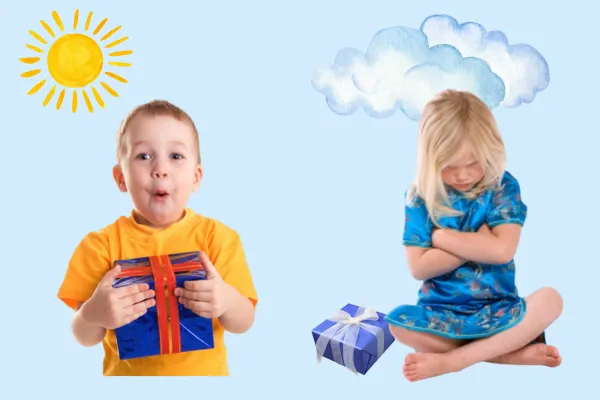
What mindset is your child catching?
Parents are often surprised to learn just how early children start developing mindsets!
We tend to think of a mindset as something that forms later, like when kids learn about a ‘growth mindset’ in school. But mindsets actually begin taking shape from as early as two or three years old! 😲
How can this be?
Because a mindset is just a way of interpreting our experiences, and kids start doing that as soon as they begin trying to understand what’s going on around them. And when they start doing that, they look to the people around them for cues!
🧠 Children’s interpretations are guided by ours…
From the toddler who checks your face when a dog approaches to the preschooler who glances at you when a stranger tussles their hair, children are constantly asking (without words):
“Is this a good thing?”
“Should I be scared?”
“Is this something to worry about?”
Our reactions teach them how to see the world:
as safe or threatening,…
as full or lacking, …
as exciting or worrying, …
Over time, these moments shape a child’s developing mindset.
💫 Why Mindset Matters for Moral and Emotional Development
Decades of research shows that our mindsets influences not only how we think but also how we feel.
Children with abundance and gratitude mindsets tend to experience:
✅ stronger empathy and connection
✅ higher emotional wellbeing
✅ better coping skills
By contrast, scarcity and victim mindsets (“there’s never enough” / “the world’s against me”) are linked to:
⚠️ reduced empathy
⚠️ learned helplessness and catastrophizing
⚠️ higher levels of self-pity and anger
That’s why helping children build healthy mindsets from a young age is SO important.
And to be clear, we’re talking about mindsets here, not circumstances. The goal isn’t to dismiss real struggles, but to help children interpret those struggles in ways that promote mental and emotional wellbeing.
🤝 How Mindsets Shape How Children Treat Others
Mindsets don’t just affect how children feel, they also influence how children relate to others.
Children with gratitude and abundance mindsets tend to approach others with warmth, trust, and generosity. They’re more likely to share, cooperate, and take joy in others’ successes. Seeing the world as “full enough” means they don’t feel the need to compete for love or resources, leading to healthier relationships.
By contrast, children with scarcity and victim mindsets often find relationships harder. When life feels like a zero-sum game (others' wins must be my losses), it’s easy to slip into jealousy and defensiveness.
So, …since the mindsets children develop shape not only how they think and feel on the inside, but also how they treat others, promoting gratitude and abundance mindsets won’t just be good for your child’s individual happiness… it’s also key to them becoming a kind and connected human being who enjoys healthy relationships.
❤️ How Parents Can Help Shape Healthy Mindsets
Below are a few, everyday ways to promote gratitude and abundance (and discourage scarcity and victim mindsets). For more practical, research-backed tools, check out Lesson #8 of our online parenting program (AU$49.95!).
🌻 Promoting a Gratitude Mindset
Model gratitude out loud
Make gratitude part of your family’s language: “Aren’t we lucky it’s sunny for our picnic!” or “I’m so lucky I’m home in time for us to all eat together”.Create small gratitude rituals
At bedtime or dinner, ask: “What’s something that made you feel lucky today?” Help them notice the small things: “I got to pat that puppy!”
🌈 Promoting an Abundance Mindset
Use ‘enough’ language
When kids worry there isn’t enough (toys, food, etc), gently reassure them: “There’s enough for everyone, we can share or take turns.”Discuss others’ good fortune with generosity
Chat with generosity about the good fortunes of others rather than with resentment. “I’m SO happy for them, that’s really going to help them a lot”. This models a win-win mentality where others’ good fortunes reflect an abundance of opportunities out there, and where 'all boats rise with the same tide'.
🚫 Discouraging a Scarcity Mindset
Avoid visibly rationing food
Regardless of how much food you actually have, avoid letting your child see you rationing it onto individual plates. Instead, serve healthy food in large communal bowls in the centre of the table, and encourage your child to serve themselves and others, guiding them to “make sure everyone gets enough.”Give your generous attention.
Some children develop a scarcity mindset when they feel there isn’t enough love to go around. What they truly need is your full, genuine attention…it tells them they’re loved and there’s plenty more where that came from. Set aside time each day or week to be fully present with your child: listen, watch, and connect on their terms.
💪 Discouraging a Victim Mindset
Encourage problem-solving.
When your child says, “It's not fair!” or “I can’t do it!”, empathise briefly and authentically, but then guide them toward one small action they can take. Ask, “What if you tried it a different way?” This builds agency and helps them shift from blaming others to focusing on their own capabilities.Avoid validating blame.
When your child shares a grievance, empathise and soothe by saying: “That must have been upsetting for you”, but avoid validating their blame. Instead of agreeing that “Tommy is always knocking things over,” reframe it kindly: “It’s bad luck your things fell over, I’m sure Tommy didn’t mean to knock them as he went past.”
🌼 The Take-Away...
Promoting one kind of mindset over another isn’t about pretending everything’s fine, it’s about helping children feel grateful for what they have and to see challenges as manageable and life as full.
Why? Because kids who see the world through this lens are more likely to enjoy higher levels of mental and emotional wellbeing, so... let's help the develop that lens! 💕

